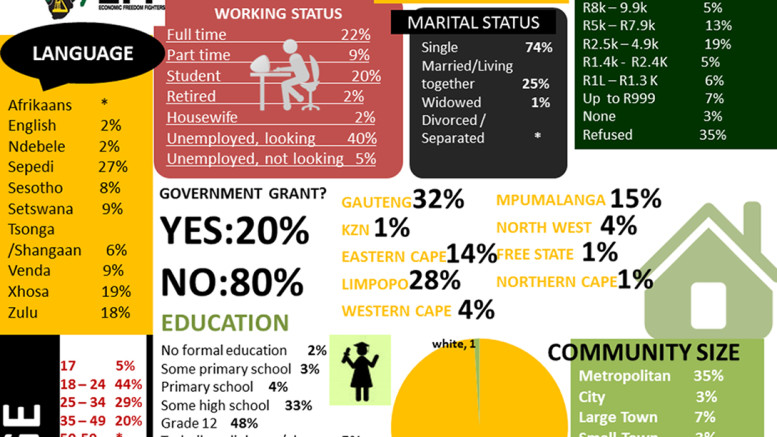South Africa’s beleaguered white minority—already subjected to an unprecedented campaign of murder, robbery and violence—are facing a renewed assault in the build-up to the 2014 national elections with the growing support for a new violently anti-white party called the “Economic Freedom Fighters” (EFF).

The EFF was founded by the former head of the African National Congress’s Youth League, Julius Malema, after he was expelled from that party.
The EFF’s policy position of the party is based on the not unjustifiable claim that twenty years after the handing over of power to the black majority in 1994, black people are still not economically “liberated”.
By this they mean that blacks are still overwhelmingly poor, and even though white wealth levels have dropped dramatically, that group still appears to be in possession of most of the remaining financial assets of the country.
This fault with this view is not so much in its factual basis, but rather in the reasons for it.
In reality, strictly enforced affirmative action laws have radically changed the nature of business transactions in South Africa, because any moderate-sized company has to have majority black owners otherwise they are unable to obtain any significant contracts and face tax penalties.
What the last twenty years has actually done is artificially economically “empower” a tiny minority of elitist blacks, not because they are capable, but simply because they are “connected” blacks.
At the same time, the South African economy has steadily regressed, primarily due to three causes:
– Continued emigration of skilled whites (most estimates say that over a quarter of the white population of pre-1994 South Africa have left the country, forced out by crime and never-ending brutal violence),
– The devastating effect of black incompetence in taking over many formerly profitable enterprises and trashing them,
– And the dramatic decline in the efficiency of the civil service and state infrastructure in all its facets.
As a result of these factors, the reality has emerged that the vast masses of Africans, with an average IQ of just 65, are unemployed, unemployable and have no prospects for any sort of advancement—just like in the rest of Africa.
At the same time, leftist dogma has brainwashed these low-IQ people into believing that all their ills are the result of “white racism” rather than their own behavior.
This witches’ brew has bred the conditions in which the EFF has emerged—a party with a policy which demands the nationalization of land, mines, banks and other assets without compensation and, in particular, on a racial basis.
At a recent launch of its party group in Marikana (in the old western Transvaal, now called the North West Province), EFF supporters carried banners reading “Honeymoon is over for whites” and “To be a revolutionary you have to be inspired by hatred and bloodshed”.


Asked about these posters, EFF leader Malema said that his party was “not racist, just honest.
“If white people want a permanent holiday they must return the stolen property,” he said, referring to the land which he bizarrely—and quite untruthfully—believes was occupied by blacks before the whites arrived in the country nearly 400 years ago.
Malema said there would never be reconciliation in the country as long as whites had the land.
“These people, the black masses are hurting… The more you become more rejecting to the idea of sharing the land you will have an unled revolution, and that is anarchy. We don’t need anarchy. Let us talk about a genuine reconciliation,” Malema said.
The EFF’s foreign policy is also shaped by its internal ideas, and contains a demand to boycott Israel, to lift the trade embargo on Cuba and support for the violent anti-white regime in Zimbabwe.
* According to a poll published in the South African news source news24, the EFF’s policies of land reform have boosted black support for the party,
According to the report, some 38 percent of respondents believed the EFF would gain support because of its policies.
According to the survey, 42 percent of young blacks approved of “land reform” as defined by the EFF.
Support for the policy was also strongest in the Free State, with 56 percent of respondents approving it.

